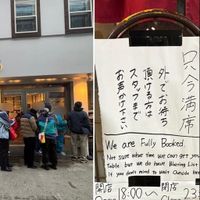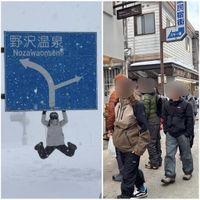In Nozawa Onsen Village, located in Nagano Prefecture, the phenomenon of overtourism is becoming increasingly pronounced, transforming the once quiet onsen town into a bustling hub primarily catering to foreign visitors. As tourism surged due to the COVID-19 pandemic, prices at accommodations and restaurants soared, creating a stark contrast to the traditional charm that characterized the area.
A 40-year-old man who visited Nozawa Onsen from Saitama Prefecture expressed his surprise at the town's transformation, stating, "When I first came here, it was filled with older Japanese tourists, but now it feels like traveling abroad. I felt like I was in another country. The rise in prices has been noticeable, with beer costing as much as 800 yen a glass!" His sentiments reflect a common observation among returning visitors who note the shift from a local to a more international atmosphere.
Similarly, a young woman from Tokyo who expected to ski in peak season noted her struggles. "I wanted to visit in January or February when the snow is best, but it was too expensive and fully booked, so I came during this off-peak time instead. Now, it’s not just tourists but also the staff at restaurants who are mostly foreigners! I often find myself at places where only English menus are available, which can make ordering a challenge," she remarked.
As day turns to evening, the streets of Nozawa Onsen see an influx of diners searching for a table, many of whom become what some locals call “dinner refugees.” Groups of university students, looking for a place to eat after a day on the slopes, were found wandering the streets. One group lamented, "We did not make reservations and cannot get into a single restaurant! It’s so crowded; we regret not booking ahead! Not getting a proper dinner was something we certainly didn’t anticipate."
A pair of 20-year-old women also shared their dining difficulties, saying, "After walking for over 30 minutes, we finally found a restaurant. But we ended up sitting at a table with strangers, which felt awkward. This isn't what we expected from a cozy onsen town."
Meanwhile, another 40-year-old man expressed disappointment about his dining experience. "I came here looking forward to drinking local sake, but all the staff were foreigners, and I was served shochu instead. Many restaurants seem to cater mostly to foreigners, serving only whiskey, cocktails, and beer. It’s really unfortunate to miss out on authentic local offerings!"
The influx of international visitors also means that many local workers face the challenges of language barriers. A 50-year-old woman running a tourist business near Iiyama Station explained, "Most of the people using the station are foreign tourists heading for skiing or hot springs, and we find it difficult to communicate. It often feels like Japanese speakers are a minority here. I’m even thinking about taking English conversation classes at my age!"
Another local business owner in her 60s noted, "English is essential for my job since most of my customers are foreigners. It’s incredible how quickly the landscape has changed—even young tourists from Southeast Asia regularly visit, and I often rely on translation apps to assist in communication."
A man in his 70s, who has run a souvenir shop for years, remarked that about 70% of his customers are foreigners. "It’s really hard for me to understand English, but I try my best because without engaging with customers, my business suffers. Tourists who attempt to speak Japanese or utilize translation devices earn my respect, while those who come in expecting me to understand English just because they are foreign can be frustrating," he admitted, adding a historical context to their current situation.
Historically, Nozawa Onsen Village has faced challenges such as the collapse of the skiing boom after Japan's economic bubble burst in the 1990s. The village, once thriving with visitors, saw ski resort attendance plummet, leading to significant financial losses. It was not until 2007, when an association promoting inbound tourism was established, that there was a dramatic resurgence of foreign tourists; the number of overnight guests increased by ten times over the next decade. A man in his 60s in the tourism industry described how beneficial the Olympic Games held in Nagano in 1998 had been in garnering international interest in local skiing events, which set a precedent for the current environment of openness to foreign visitors.
Despite this positivity, some locals raised concerns about communication when emergencies arise. The same elderly man mentioned, "When a foreign tourist requires an ambulance due to injury or illness, many of the emergency medical staff are not fluent in English, which makes things difficult." This highlights a gap in local response capabilities that can hinder tourist safety during their visits.
As Nozawa Onsen continues to evolve into what some are calling the 'second Niseko' due to its rising popularity among foreigners, it faces many challenges. The streets filled with “dinner refugees” illustrate just one of the many frustrations that locals and tourists alike are experiencing. The balancing act of embracing increased tourism while retaining the town's native flavor and cultural essence represents a growing tension that the villagers are still grappling with.
Clearly, Nozawa Onsen is at a crossroads where both opportunity and challenge coexist. As more foreign tourists arrive, the local population is learning to adapt to this new reality—dealing not only with changing business dynamics but also a cultural exchange that could redefine the spirit of this historic onsen town.





